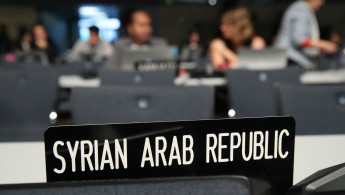US only country opposed to Paris accord, as Syria agrees to climate change pact
Just a month ago, there were just three countries in the world opposed to the landmark 2015 Paris pledge to tackle climate change.
After previously denouncing the Paris agreement as "too weak", Central America's Nicaragua joined 195 other nations in the world and signed the accord in October.
It left just Syria and the US as the only countries outside the accord to cut greenhouse gases.
On Tuesday, Syrian deputy Environment Minister Wadah Katmawi said Damascus was ready to ratify the Paris agreement.
"I would like to affirm the Syrian Arab Republic's commitment to the Paris climate change accord," Katmawi told a delegation on climate change conference in Germany.
The announcement at the summit was met with no applause from the other delegates, who were perhaps mindful of the mass atrocities committed by the Syrian regime.
Syria says it was unable to sign up to the agreement in Paris due to international sanctions, as many of its ministers and officials are banned from travelling to Europe.
Although the Syria had not formally signed the accord yet, its pledge leaves the US as the world's only state opposed to the agreement to cut carbon emissions.
Washington did sign up in 2015 under former President Barack Obama but recently informally quit the accord, with the US' chair left unoccupied at Tuesday's climate change conference in Bonn.
Syria's announcement puts more pressure on Washington to throw its support behind the Paris agreement, after President Donald Trump's announced in summer that the US would pull out of the accord unless it was given more favourable carbon targets.
"Now he'll be isolated from all nations," David Waskow, the World Resources Institute think-tank told Reuters.
The Paris agreement seeks to limit the rise in global temperatures - caused by greenhouse gases - to 1.5 degrees Celsius above pre-industrial times.
Fears of melting ice-caps leading to floods in major cities and other major humanitarian crises is a major cause of concern for scientists, activists and politicians.
With the world's largest economy, the US, opposed to the agreement and without the second highest CO2 emissions environmentalists say it is essential for Washington to sign up.
With Donald Trump in charge and vehemently opposed to the agreement, Syria's move will have little impact.





 Follow the Middle East's top stories in English at The New Arab on Google News
Follow the Middle East's top stories in English at The New Arab on Google News
![Netanyahu furiously denounced the ICC [Getty]](/sites/default/files/styles/image_330x185/public/2024-11/GettyImages-2169352575.jpg?h=199d8c1f&itok=-vRiruf5)
![Both Hamas and the Palestinian Authority welcomed the ICC arrest warrants [Getty]](/sites/default/files/styles/image_330x185/public/2024-11/GettyImages-2178351173.jpg?h=199d8c1f&itok=TV858iVg)
